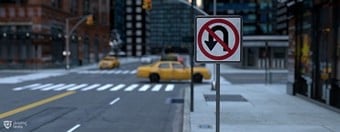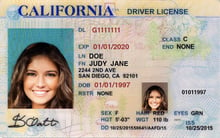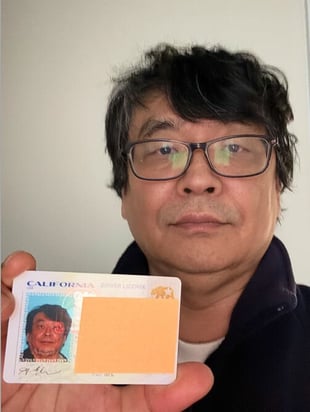

All your missed questions are saved
automatically for extra practice.




It's a practice test that's automatically made up of all your missed questions. Once you finish this test, you’ll be able to revisit your Challenge Bank™ to practice and sharpen your skills.
View All PlansAdding difficult questions to Challenge Bank™ is an exclusive Premium feature. Unlock access to 650+ exam-like questions, a Pass Guarantee, personalized study plans, and more.
View All PlansFree Online DMV Written Test Practice for California (2026)
| 90-100 | => | 11% |
| 80-89 | => | 24% |
| 70-79 | => | 28% |
| 60-69 | => | 21% |
| <60% | => | 16% |
In California, if you’re under 18 or have never held a driver’s license before, you must obtain an instruction permit to practice driving under supervision before you may apply for a driver’s license. To be eligible for a permit, you must be at least 15½ years old, fill out an application, meet the documentation requirements, pay the appropriate fees, and pass a vision exam and an official knowledge test. You may take the knowledge test online or at a DMV field office. If you’re under 18, you must also be enrolled in or have completed an approved driver education course, and your parent or guardian must sign your application.
The knowledge test has 46 multiple-choice questions based on the official driver’s manual (California DMV Driver's Handbook 2026: Interactive Manual w/Audio).
This is our Permit Practice Tests. All our permit practice tests have been designed to help aspiring drivers like you pass the California DMV written (knowledge) test on their first try. These practice tests are based on the official California driver’s manual and up to date as of March 2026. This DMV driving test includes questions on driving emergencies, freeway driving, headlights, lanes, parking, passing, pavement markings, road signs, and roundabouts. If you don’t know the correct answer to a question, ask our AI Assistant to give you a hint or discuss the question in more depth. You can also ask it your own questions about driving. If you still answer incorrectly, the question will turn red in the Progress Bar, and the AI Assistant will provide you with the correct answer and an explanation.


Reviewed for legal and handbook accuracy
M.S., Chief Educational Researcher (ACES member)
Last verified for accuracy on
Real California drivers who passed first try
Verified student reviews • Shared with permission


About the California learner permit
We also have several other knowledge test preparation tools for you. We’ve created two downloadable PDF “cheat sheets” (though they’re not for actual cheating!): “The Top 100 Most Common US DMV Questions” and “The 121 Most Common US Road Signs Questions.” You will likely encounter some of these questions on your written knowledge test. The correct answer is provided for each question listed.
Finally, we also offer our own California DMV Permit Test Study Guide to help you practice for the day of the DMV written test. It covers what documents to have with you, what fees you may have to pay, frequently missed knowledge test questions, and other last-minute knowledge test tips.
More CA DMV written exam resources
Are you in another state?
- Alabama
- Alaska
- Arizona
- Arkansas
- California
- Colorado
- Connecticut
- Delaware
- District of Columbia
- Florida
- Georgia
- Hawaii
- Idaho
- Illinois
- Indiana
- Iowa
- Kansas
- Kentucky
- Louisiana
- Maine
- Maryland
- Massachusetts
- Michigan
- Minnesota
- Mississippi
- Missouri
- Montana
- Nebraska
- Nevada
- New Hampshire
- New Jersey
- New Mexico
- New York
- North Carolina
- North Dakota
- Ohio
- Oklahoma
- Oregon
- Pennsylvania
- Rhode Island
- South Carolina
- South Dakota
- Tennessee
- Texas
- Utah
- Vermont
- Virginia
- Washington
- West Virginia
- Wisconsin
- Wyoming
We know what it takes to pass. And we’ve got the proof.
Driver’s Ed is - nobody wants to set foot inside the DMV. That’s why millions of learners trust us for simple, visual, effective prep.
An official & trusted partner in driver education
We are an officially recognized FMCSA Entry-Level Driver Training provider and a proud partner to over 2,500 libraries. We work with safety organizations like GHSA and the National Safety Council to help create safer roads for everyone.






A smarter way to study
Challenge Bank™
Our trademarked system automatically saves questions you miss, creating personalized tests that target your weak spots until you’ve mastered the material.
AI-powered feedback
Get smarter as you study. Our new AI-powered feedback provides detailed, question-level insights to help you understand the why behind each answer.
Interactive handbook
Go beyond the boring black-and-white manual. Our interactive handbook lets you read, listen with an MP3 audio version, or even chat with it to find the information you need, faster.
We build our practice questions from the current 2026 CA Driver Handbook and refine them using patterns recent test‑takers report.
Driver handbook • Knowledge‑test/permit overview • Fees & ID requirements • Office/appointment info
We mirror recurring themes (e.g., right‑of‑way traps, sign look‑alikes) and use similar distractors and wording styles.
We don’t collect or publish actual test items and we’re not affiliated with DMV.

